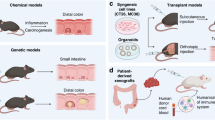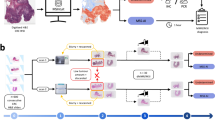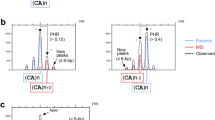Abstract
Colorectal cancer (CRC) has a high incidence and mortality worldwide. Microsatellite instability (MSI) is crucial in CRC, with distinct molecular and clinicopathological features in patients. Nowadays, it is a predictive marker for immunotherapy. We proposed to evaluate the 5-year outcome of MSI status in 1002 Brazilian CRC, and associate it with genetic ancestry, molecular and clinicopathological features. MSI evaluation was performed using molecular markers. MSI+ tumors were analyzed for alterations in 23 MSI-targeted genes. Genetic ancestry was evaluated using an Ancestry-Informative markers panel. MSI status was analyzed in relation to CRC specific survival and other clinical and genetic variables. MSI+ status was observed in 10.5% of cases. MSI+ status was significantly associated with the anatomic site right colon, mucinous histological type, clinical stage II, histological grade III/undifferentiated, no recurrence of disease, and live cases without cancer. No association of MSI status with genetic ancestry components was observed. MSI-targeted genes analyses showed the most frequently altered genes: ATM, EGFR, MRE11, ROCK1, and TGFBRII. There was a statistically significant difference in cancer-specific survival between cases according to MSI status. This study constitutes the most comprehensive analyses of the MSI impact on the Brazilian CRC. MSI+ frequency in Brazilian CRC agreed with the literature and was associated with several clinicopathological features related with less aggressive tumors, independently of their genetic ancestry.
This is a preview of subscription content, access via your institution
Access options
Subscribe to this journal
Receive 12 print issues and online access
$259.00 per year
only $21.58 per issue
Buy this article
- Purchase on SpringerLink
- Instant access to the full article PDF.
USD 39.95
Prices may be subject to local taxes which are calculated during checkout


Similar content being viewed by others
Data availability
Data supporting the results reported in this manuscript can be found within the article and its Supplementary Files.
References
Siegel RL, Miller KD, Fuchs HE, Jemal A. Cancer Statistics, 2021. CA: Cancer J Clin. 2021;71:7–33.
Sung H, Ferlay J, Siegel RL, Laversanne M, Soerjomataram I, Jemal A, et al. Global Cancer Statistics 2020: GLOBOCAN Estimates of Incidence and Mortality Worldwide for 36 Cancers in 185 Countries. CA: Cancer J Clin. 2021;71:209–49.
Instituto Nacional de Câncer José Alencar Gomes da Silva (INCA). Ministério da Saúde. Estimate/2020 – Cancer Incidence in Brazil. 2019.
Kuipers EJ, Grady WM, Lieberman D, Seufferlein T, Sung JJ, Boelens PG, et al. Colorectal cancer. Nat Rev Dis Primers. 2015;15065:1–25.
Safiri S, Sepanlou SG, Ikuta KS, Bisignano C, Salimzadeh H, Delavari A, et al. The global, regional, and national burden of colorectal cancer and its attributable risk factors in 195 countries and territories, 1990–2017: a systematic analysis for the Global Burden of Disease Study 2017. Lancet Gastroenterol Hepatol. 2019;4:913–33.
de Carvalho T, Borges AK, da Silva I. Incidence of colorectal cancer in selected countries of Latin America: age-period-cohort effect. Asian Pacific J Cancer Preven. 2020;21:3421–8.
Markowitz SD, Bertagnolli MM. Molecular origins of cancer: Molecular basis of colorectal cancer. N. Engl J Med [Internet]. 2009;361:2449–60. http://www.ncbi.nlm.nih.gov/pubmed/20018966.
Boland CR, Goel A. Microsatellite instability in colorectal cancer. Gastroenterol [Internet]. 2010;138:2073–.e3. http://www.ncbi.nlm.nih.gov/pubmed/20420947.
Guinney J, Dienstmann R, Wang X, de Reynies A, Schlicker A, Soneson C, et al. The consensus molecular subtypes of colorectal cancer. Nat Med [Internet]. 2015;21:1350–6. http://www.ncbi.nlm.nih.gov/pubmed/26457759.
Valle L, Vilar E, Tavtigian SV, Stoffel EM. Genetic predisposition to colorectal cancer: syndromes, genes, classification of genetic variants and implications for precision medicine. J Pathol John Wiley Sons Ltd. 2019;247:574–88.
Vilar E, Gruber SB. Microsatellite instability in colorectal cancerthe stable evidence. Nat Rev Clin Oncol. 2010;7:153–62.
Kim TM, Laird PW, Park PJ. The landscape of microsatellite instability in colorectal and endometrial cancer genomes. Cell [Internet]. 2013;155:858–68. http://www.ncbi.nlm.nih.gov/pubmed/24209623.
Hause RJ, Pritchard CC, Shendure J, Salipante SJ. Classification and characterization of microsatellite instability across 18 cancer types. Nat Med [Internet]. 2016;22:1342–50. http://www.ncbi.nlm.nih.gov/pubmed/27694933.
Li K, Luo H, Huang L, Luo H, Zhu X. Microsatellite instability: a review of what the oncologist should know. Vol. 20, Cancer Cell International. BioMed Central Ltd.; 2020.
Le DT, Durham JN, Smith KN, Wang H, Bartlett BR, Aulakh LK, et al. Mismatch repair deficiency predicts response of solid tumors to PD-1 blockade. Science. 2017;357:409–13.
Xicola RM, Gagnon M, Clark JR, Carroll T, Gao W, Fernandez C, et al. Excess of proximal microsatellite-stable colorectal cancer in African Americans from a multiethnic study. Clin Cancer Res. 2014;20:4962–70.
Carethers JM, Murali B, Yang B, Doctolero RT, Tajima A, Basa R, et al. Influence of race on microsatellite instability and CD8+ T cell infiltration in colon cancer. PLoS ONE. 2014;9:e100461.
Durães RO, Berardinelli GN, da Costa AM, Scapulatempo-Neto C, Pereira R, Oliveira MA, et al. Role of Genetic Ancestry in 1,002 Brazilian Colorectal Cancer Patients From Barretos Cancer Hospital. Front Oncol. 2020;10:1–12.
Ashktorab H, Ahuja S, Kannan L, Llor X, Ellis NA, Xicola RM, et al. A meta-analysis of MSI frequency and race in colorectal cancer. Oncotarget. 2016;7:34546–57.
dos Santos LV, Faria TMV, Lima ABC, Abdalla KC, de Moraes ED, Cruz MR, et al. Timing of adjuvant chemotherapy in colorectal cancer. Colorectal Dis. 2016;18:871–6.
de Paula AE, Galvão H de CR, Bonatelli M, Sabato C, Fernandes GC, et al. Clinicopathological and molecular characterization of Brazilian families at risk for Lynch syndrome. Cancer Genetics. 2021;254–255:82–91.
Berardinelli GN, Scapulatempo-Neto C, Durães R, Antônio de Oliveira M, Guimarães D, Reis RM. Advantage of HSP110 (T17) marker inclusion for microsatellite instability (MSI) detection in colorectal cancer patients. Oncotarget [Internet]. 2018;9:28691–701. https://www.oncotarget.com/lookup/doi/10.18632/oncotarget.25611.
Campanella NC, Berardinelli GN, Scapulatempo-Neto C, Viana D, Palmero EI, Pereira R, et al. Optimization of a pentaplex panel for MSI analysis without control DNA in a Brazilian population: correlation with ancestry markers. Eur J Hum Genet [Internet]. 2014;22:875–80. http://www.ncbi.nlm.nih.gov/pubmed/24193342.
Viana-Pereira M, Almeida I, Sousa S, Mahler-Araújo B, Seruca R, Pimentel J, et al. Analysis of microsatellite instability in medulloblastoma. Neuro Oncol [Internet]. 2009;11:458–67. http://www.ncbi.nlm.nih.gov/pubmed/19179424.
Pereira R, Phillips C, Pinto N, Santos C, dos Santos SE, Amorim A, et al. Straightforward inference of ancestry and admixture proportions through ancestry-informative insertion deletion multiplexing. PLoS ONE [Internet]. 2012;7:e29684. http://www.ncbi.nlm.nih.gov/pubmed/22272242.
Pritchard JK, Stephens M, Donnelly P. Inference of population structure using multilocus genotype data. Genet [Internet]. 2000;155:945–59. http://www.stats.ox.ac.uk/pritch/home.html.
Falush D, Stephens M, Pritchard JK. Inference of population structure using multilocus genotype data: linked loci and correlated allele frequencies. Genet [Internet]. 2003;164:1567–87.
Advani SM, Shi Q, Overman MJ, Loree JM, Lam M, Morris V, et al. Patient-reported symptom outcomes and microsatellite instability in patients with metastatic colorectal cancer. Clin Colorectal Cancer. 2020;19:48–56.e2.
Yoon YS, Yu CS, Kim TW, Kim JH, Jang SJ, Cho DH, et al. Mismatch repair status in sporadic colorectal cancer: immunohistochemistry and microsatellite instability analyses. J Gastroenterol Hepatol [Internet]. 2011;26:1733–9. http://www.ncbi.nlm.nih.gov/pubmed/21615788.
Corso G, Pascale V, Flauti G, Ferrara F, Marrelli D, Roviello F. Oncogenic mutations and microsatellite instability phenotype predict specific anatomical subsite in colorectal cancer patients. Eur J Hum Genet. 2013;21:1383–8.
Cancer Genome Atlas N. Comprehensive molecular characterization of human colon and rectal cancer. Nat [Internet]. 2012;487:330–7. http://www.ncbi.nlm.nih.gov/pubmed/22810696.
Leite SM, Gomes KB, Pardini VC, Ferreira AC, Oliveira VC, Cruz GM. Assessment of microsatellite instability in colorectal cancer patients from Brazil. Mol Biol Rep. [Internet]. 2010;37:375–80. http://www.ncbi.nlm.nih.gov/pubmed/19784864.
Nam SK, Yun S, Koh J, Kwak Y, Seo AN, Park KU, et al. BRAF, PIK3CA, and HER2 oncogenic alterations according to KRAS mutation status in advanced colorectal cancers with distant metastasis. PLoS ONE [Internet]. 2016;11:e0151865 http://www.ncbi.nlm.nih.gov/pubmed/26991109.
Guastadisegni C, Colafranceschi M, Ottini L, Dogliotti E. Microsatellite instability as a marker of prognosis and response to therapy: a meta-analysis of colorectal cancer survival data. Eur J Cancer [Internet]. 2010;46:2788–98. http://www.ncbi.nlm.nih.gov/pubmed/20627535.
Popat S, Hubner R, Houlston RS. Systematic review of microsatellite instability and colorectal cancer prognosis. J Clin Oncol [Internet]. 2005;23:609–18. http://www.ncbi.nlm.nih.gov/pubmed/15659508.
Laghi L, Malesci A. Microsatellite instability and therapeutic consequences in colorectal cancer. Dig Dis [Internet]. 2012;30:304–9. http://www.ncbi.nlm.nih.gov/pubmed/22722556.
Kocarnik JM, Shiovitz S, Phipps AI. Molecular phenotypes of colorectal cancer and potential clinical applications. Gastroenterol Rep. (Oxf) [Internet]. 2015;3:269–76. http://www.ncbi.nlm.nih.gov/pubmed/26337942.
Ronnekleiv-Kelly SM, Burkhart RA, Pawlik TM. Molecular markers of prognosis and therapeutic targets in metastatic colorectal cancer. Surg Oncol [Internet]. 2016;25:190–9. http://www.ncbi.nlm.nih.gov/pubmed/27566022.
Gavin PG, Colangelo LH, Fumagalli D, Tanaka N, Remillard MY, Yothers G, et al. Mutation profiling and microsatellite instability in stage II and III colon cancer: an assessment of their prognostic and oxaliplatin predictive value. Clin Cancer Res [Internet]. 2012;18:6531–41. http://www.ncbi.nlm.nih.gov/pubmed/23045248.
Webber EM, Kauffman TL, O’Connor E, Goddard KA. Systematic review of the predictive effect of MSI status in colorectal cancer patients undergoing 5FU-based chemotherapy. BMC Cancer [Internet]. 2015;15:156. http://www.ncbi.nlm.nih.gov/pubmed/25884995.
Sturgeon CM, Duffy MJ, Stenman UH, Lilja H, Brunner N, Chan DW, et al. National Academy of Clinical Biochemistry laboratory medicine practice guidelines for use of tumor markers in testicular, prostate, colorectal, breast, and ovarian cancers. Clin Chem [Internet]. 2008;54:e11–79. http://www.ncbi.nlm.nih.gov/pubmed/19042984.
Duffy MJ, van Dalen A, Haglund C, Hansson L, Holinski-Feder E, Klapdor R, et al. Tumour markers in colorectal cancer: European Group on Tumour Markers (EGTM) guidelines for clinical use. Eur J Cancer [Internet]. 2007;43:1348–60. http://www.ncbi.nlm.nih.gov/pubmed/17512720.
Alex AK, Siqueira S, Coudry R, Santos J, Alves M, Hoff PM, et al. Response to chemotherapy and prognosis in metastatic colorectal cancer with DNA deficient mismatch repair. Clin Colorectal Cancer. 2017;16:228–39.
Ribic CM, Sargent DJ, Moore MJ, Thibodeau SN, French AJ, Goldberg RM, et al. Tumor microsatellite-instability status as a predictor of benefit from fluorouracil-based adjuvant chemotherapy for colon cancer. N. Engl J Med. 2003;349:247–57.
Giannini G, Ristori E, Cerignoli F, Rinaldi C, Zani M, Viel A, et al. Human MRE11 is inactivated in mismatch repair‐deficient cancers. EMBO Rep. 2002;3:248–54.
Vilar E, Bartnik CM, Stenzel SL, Raskin L, Ahn J, Moreno V, et al. MRE11 deficiency increases sensitivity to Poly(ADP-ribose) polymerase inhibition in microsatellite unstable colorectal cancers. Cancer Res. 2011;71:2632–42.
Grady WM, Markowitz SD. TGF-B signaling pathway and tumor supression. In: Derynck KR;M, editor. The TGF-β family. Cold Spring Harbor,NY: Cold Spring Harbor Laboratory Press; 2008. p. 889–938.
Tsang AH, Cheng KH, Wong AS, Ng SS, Ma BB, Chan CM, et al. Current and future molecular diagnostics in colorectal cancer and colorectal adenoma. World J Gastroenterol [Internet]. 2014;20:3847–57. http://www.ncbi.nlm.nih.gov/pubmed/24744577.
Pawlik TM, Raut CP, Rodriguez-Bigas MA. Colorectal carcinogenesis: MSI-H versus MSI-L. Dis Markers [Internet]. 2004;20:199–206. http://www.ncbi.nlm.nih.gov/pubmed/15528785.
Watanabe T, Wu TT, Catalano PJ, Ueki T, Satriano R, Haller DG, et al. Molecular predictors of survival after adjuvant chemotherapy for colon cancer. N. Engl J Med [Internet]. 2001;344:1196–206. http://www.ncbi.nlm.nih.gov/pubmed/11309634.
Acknowledgements
The authors acknowledge Dr. Adriane Feijó and Dr. Luciane Sussuchi for their assistance in preparing the figures.
Funding
This study was partially supported by Barretos Cancer Hospital Internal Research Funds (PAIP) of participant authors and the Public Ministry of Labor – Campinas, São Paulo (Research, Prevention, and Education of Occupational Cancer). RMR was the recipient of a National Council of Technological and Scientific Development (CNPq) scholarship. AMC had financial support from the São Paulo Government (São Paulo Research Foundation – FAPESP) through the grants numbers 2019/21722–0 and 2018/22097–0.
Author information
Authors and Affiliations
Contributions
GNB participated in study design, collection of the data, analyzed the data, and prepared the manuscript. RD participated in the collection of the clinical data and analyzed the data. AMC participated in the collection of the data and analyzed the data. AB participated in re-evaluation of the clinical data and analyzed the data. MO participated in the statistical analyses and analyzed the data. RP participated in the ancestry analyses and analyzed the data. CS-N participated in the collection of the data and re-evaluation of the diagnoses. DPG participated in re-evaluation of the diagnoses and analyzed the data. RMR participated in study design, coordination, analyses of the data, and prepared the manuscript. All authors read and approved the final manuscript.
Corresponding author
Ethics declarations
Competing interests
The authors declare no competing interests.
Ethics approval and consent to participate
The study was evaluated and approved by Institutional Ethics Committee (protocol number: 600/2012 - CAAE: 02468812.30000.5437).
Additional information
Publisher’s note Springer Nature remains neutral with regard to jurisdictional claims in published maps and institutional affiliations.
Rights and permissions
About this article
Cite this article
Berardinelli, G.N., Durães, R., Mafra da Costa, A. et al. Association of microsatellite instability (MSI) status with the 5-year outcome and genetic ancestry in a large Brazilian cohort of colorectal cancer. Eur J Hum Genet 30, 824–832 (2022). https://doi.org/10.1038/s41431-022-01104-y
Received:
Revised:
Accepted:
Published:
Version of record:
Issue date:
DOI: https://doi.org/10.1038/s41431-022-01104-y
This article is cited by
-
Independent prognostic significance of tumor budding and poorly differentiated clusters in Brazilian patients with stage II colorectal cancer
Surgical and Experimental Pathology (2025)
-
A pan-cancer analysis of the core pre-mRNA 3′ end processing factors, and their association with prognosis, tumor microenvironment, and potential targets
Scientific Reports (2024)
-
A CT-based deep learning for segmenting tumors and predicting microsatellite instability in patients with colorectal cancers: a multicenter cohort study
La radiologia medica (2024)
-
Pan-tumor validation of a NGS fraction-based MSI analysis as a predictor of response to Pembrolizumab
npj Precision Oncology (2024)
-
Establishment and molecular characterization of HCB-541, a novel and aggressive human cutaneous squamous cell carcinoma cell line
Human Cell (2024)



